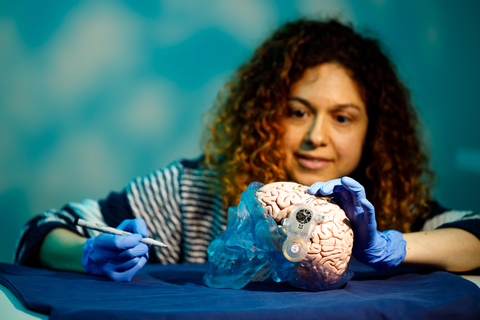Wyss Center for Bio and Neuroengineering: nieuwe horizonten in neurale opnamesystemen
Nieuwe whitepaper onthult eerste hersensignalen geregistreerd door het ABILITY-systeem en de volgende stappen naar klinische proeven bij mensen voor mensen met ernstige verlamming
GENVE–(BUSINESS WIRE)– Een nieuwe whitepaper, uitgegeven door het Wyss Center for Bio and Neuroengineering, onthult de eerste neurale signalen die zijn geregistreerd door het ABILITY brain-computer interface (BCI) -systeem. Het beschrijft ook het plan voor een aanstaande klinische proef bij mensen met ABILITY om communicatie mogelijk te maken voor mensen die vastzitten als gevolg van een hersenstam beroerte of ALS (amyotrofische laterale sclerose). Het Wyss Center-team ontwikkelt samen met academische en klinische medewerkers en een netwerk van industriële technologiepartners ABILITY, een draadloos implanteerbaar medisch apparaat, om de kwaliteit van leven te verbeteren en onafhankelijkheid te bieden aan mensen met verlamming.
Jonas Zimmerman, PhD, Senior Neuroscientist bij het Wyss Center, legt uit: “Neurowetenschap beleeft een wereldwijde renaissance. In de afgelopen jaren hebben veel getalenteerde onderzoeksgroepen en marktleiders nieuwe technologieën ontwikkeld die klaar zijn om op maat gemaakt te worden voor mensen met ernstige verlamming. Dit is het moment om voort te bouwen op deze prestaties, de laatste hindernissen te overwinnen en neurale interfacetechnologie te brengen voor degenen die dit het meest nodig hebben.”
Wyss Center for Bio and Neuroengineering: New Horizons in Neural Recording Systems
New whitepaper reveals first brain signals recorded by the ABILITY system and the next steps to human clinical trials for people with severe paralysis
GENEVA–(BUSINESS WIRE)– A new whitepaper, released by the Wyss Center for Bio and Neuroengineering, reveals the first neural signals recorded by the ABILITY brain-computer interface (BCI) system. It also lays out the plan for a forthcoming human clinical trial with ABILITY to enable communication for people locked-in as a result of brain stem stroke or ALS (amyotrophic lateral sclerosis). The Wyss Center team, together with academic and clinical collaborators and a network of industrial technology partners, is developing ABILITY, a wireless implantable medical device, to improve quality of life and provide independence for people with paralysis.
This press release features multimedia. View the full release here: https://www.businesswire.com/news/home/20221012005582/en/

ABILITY is a fully implantable neural recording system designed to amplify and wirelessly transmit high channel count, high frequency neural data from the brain to a computer in order to restore communication and independence for people with severe paralysis. ©Wyss Center
Jonas Zimmerman, PhD, Senior Neuroscientist at the Wyss Center, explains: “Neuroscience is experiencing a global renaissance. In recent years many talented research groups and industry leaders have developed new technologies ready to be tailored for people with severe paralysis. Now is the time to build on these achievements, overcome the final hurdles, and bring neural interface technology to those who need it most.”
“The Wyss Center team and my lab are working together towards the same goal of restoring communication for people who are locked-in. We believe that future brain-computer interfaces will go far beyond current technology and have the exciting potential to bring new levels of independence to people with paralysis in their daily life.” says Prof. Nick Ramsey from the UMC Utrecht Brain Center and Wyss Center collaborator.
George Kouvas, MBA, Wyss Center Chief Technology Officer says: “With fully implantable brain-computer interfaces still in their infancy, our approach at the Wyss Center is to offer a versatile system that not only connects to multiple electrode technologies, but that records neural signals from many channels at very high frequencies and wirelessly transmits the raw data using a high-speed optical link. In these early days, we believe that a versatile technology like ABILITY addresses the unmet needs of early adopters and, as a consequence, has the potential to help the BCI market grow.”
The whitepaper draws on experience from a recent clinical case study that successfully enabled BCI communication for a person completely locked-in because of ALS. It reviews existing methods of recording electrical activity from the brain and describes the clinical need for breakthrough implant technology. Finally, it describes the next steps to a clinical study that will not only assess the device performance but also the acceptance of implantable BCIs by patients, caregivers, and health care professionals.
ENDS
About the Wyss Center for Bio and Neuroengineering, Geneva, Switzerland
The Wyss Center is an independent, non-profit, research and development organization that advances our understanding of the brain to realize therapies and improve lives.
View source version on businesswire.com: https://www.businesswire.com/news/home/20221012005582/en/
Contacts
Wyss Center media contact
Jo Bowler, Communications Manager
+41 (0) 58 201 03 09

